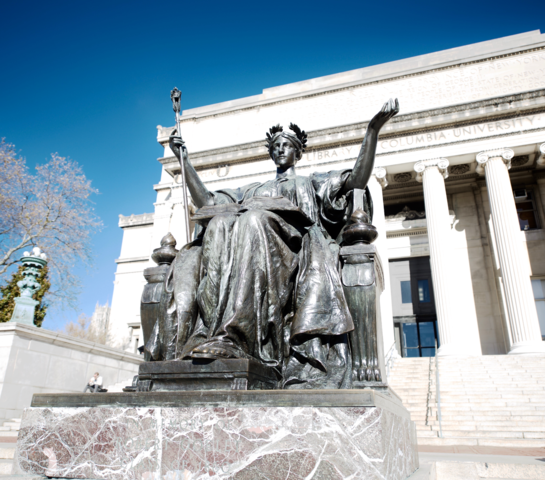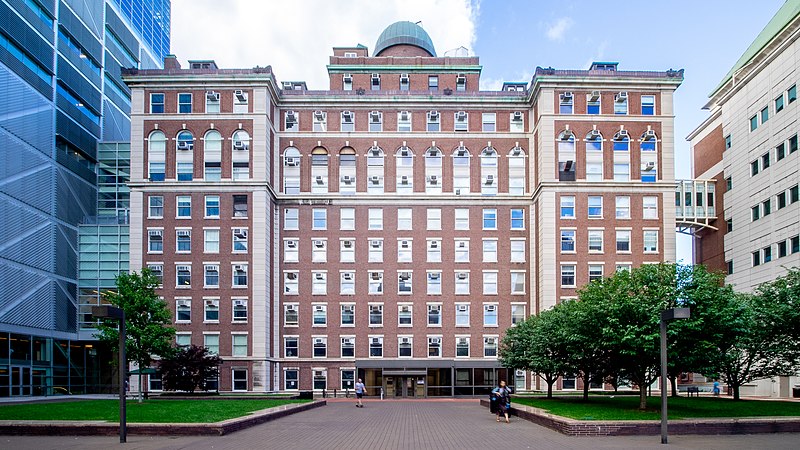
As Thammasat University students grow accustomed to online learning and distance education, some may wish to explore overseas opportunities after they have done their required coursework. Taking an extra class may be informative and help complement main areas of study, giving students new ideas and perspectives.
Columbia University is a private research university in New York City. The Columbia University Physics Department has been affiliated with 33 Nobel Prize winners as alumni, faculty or research staff. 22 Nobel Prize winners in Physiology or Medicine have been affiliated with Columbia.
Former U.S. Presidents Theodore Roosevelt and Franklin Delano Roosevelt attended the law school. Other political figures educated at Columbia include former U.S President Barack Obama, Associate Justice of the U.S. Supreme Court Ruth Bader Ginsburg, former U.S. Secretary of State Madeleine Albright, former chairman of the U.S. Federal Reserve Bank Alan Greenspan, and U.S. Attorney General Eric Holder. The author of India’s constitution, Dr. B. R. Ambedkar, was also an alumnus of Columbia.
Among Columbia alumni with careers in the arts have been the composer Richard Rodgers and lyricists Oscar Hammerstein II and Lorenz Hart, [329] and Art Garfunkel.[330] Four United States Poet Laureates received their degrees as well as the poets Allen Ginsberg and Langston Hughes and fiction writers Isaac Asimov, J.D. Salinger, and Upton Sinclair. Many of these authors are represented in the collection of the Thammasat University Library.
The TU Library also owns many books published by Columbia University Press, a distinguished academic publisher.
Like some other international universities, Columbia University offers a range of free massive open online courses (MOOCs) that TU students may consider.
Among these opportunities:
Social Welfare Policy for Practitioners & Citizens.
This class is intended for health practitioners, educators, social service providers, anyone who works with people or who votes in elections. The online course description follows:
In the U.S., social policy accounts for two-thirds of government spending. Knowing how policies are constructed, what values underlie them, and how they succeed or fail makes everyone more effective at work or in their civic role. This specialization includes an HONORS track in which learners will complete a professional social policy analysis.
Teachers, health care workers, police, and social workers interact with policy daily, but all of us should care about the impact and effectiveness of these programs. Health and mental health programs, education, housing and income supports, pensions, criminal justice services, veterans’ programs, child protective services, and immigration services create a support system all Americans will draw upon. They also reveal Americans’ ethics and values, indicating how we regard and care for our most vulnerable.
This specialization will explore the size, structure, and outcomes of U.S. social policy by
- comparing it with the approaches of other developed nations.
- examining the history of our efforts and probing population effects that shape policy.
- looking deeply into support for families in general, poor families, people with disabilities, and the elderly.
- mapping out existing policies for housing, education, healthcare, immigration and child welfare.
- addressing issues of power, oppression, and white supremacy.
By the end of the course the learner will be at home working in, utilizing, and voting in the U.S. welfare system.
WHAT YOU WILL LEARN
- Compare historical, intellectual and cross-national perspectives on the size, structure and outcomes of U.S. social policy
- Demonstrate knowledge of U.S. social welfare policy and its economic, social, and political contexts, in order to be an engaged citizen
- Differentiate the various levels and structures of public benefits, and the social justice impact on people receiving them
- Formulate skills in social policy implementation in order to be more effective in professional practice
SKILLS YOU WILL GAIN
- Formulate practice strategies to overcome the historic biases in social welfare programs
- distinguish the values inherent in each social policy initiative
- differentiate alternative approaches to social policy problems
- Critique components of a social policy based on their effectiveness at meeting the goals stated in the initiative
- develop social welfare policy analysis and reform proposals
The course instructor will be Dr. John Robertson, a Policy Lecturer in the School of Social Work, Columbia University. His online biography reads:
Dr. John Robertson is a policy expert who teaches Social Welfare Policy, Policy Practice, and Advocacy in Social Work Practice at the Columbia School of Social Work… A former monk, he continues to live by the Franciscan values of humility, love, and joy, and the belief that “if you want to find hope, you have to be present with and move with and live with people who are struggling, not just for them but for yourself.” He holds a BA in Economics from St. John’s College, University of Manitoba; an MSW from Rutgers University; and a PhD in Labor Economics and Social Policy from the Columbia School of Social Work.

In another available MOOC, TU students interested in economics, sociology, development studies, physical science, and engineering as well as environmental science and sustainability may find useful information.
The Age of Sustainable Development gives students an understanding of the key challenges and pathways to sustainable development – that is, economic development that is also socially inclusive and environmentally sustainable:
SKILLS YOU WILL GAIN
- Energy
- Sustainable Energy
- Urban Planning
- Environmental Protection
The class instructor will be Dr. Jeffrey Sachs, director of the Earth Institute and Professor of Sustainable Development and Health Policy and Management at Columbia University:
Jeffrey D. Sachs is a world-renowned economics professor, leader in sustainable development, senior UN advisor, bestselling author, and syndicated columnist. Professor Sachs serves as the Director of The Earth Institute, Quetelet Professor of Sustainable Development, and Professor of Health Policy and Management at Columbia University. He is Special Advisor to United Nations Secretary-General Ban Ki-moon on the Millennium Development Goals, and held the same position under former Secretary-General Kofi Annan. He is Director of the UN Sustainable Development Solutions Network, as well as co-founder and director of the Millennium Villages Project. Sachs is also one of the Secretary-General’s MDG Advocates, and a Commissioner of the ITU/UNESCO Broadband Commission for Development. Professor Sachs is widely considered to be one of the world’s leading experts on sustainable economic development and the fight against poverty…
The TU Library owns a number of books written by Dr. Jeffrey Sachs.
These include The Age of Sustainable Development, copies of which are shelved in the Professor Direk Jayanama Library, Faculty of Political Science, Tha Prachan campus, and the Puey Ungphakorn Library, Faculty of Economics, Tha Prachan campus.
Among other books written, coauthored, or coedited by Dr. Jeffrey Sachs in the TU Library collection are The Asian Financial Crisis: Lessons for a Resilient Asia; Common Wealth: Economics for a Crowded Planet; Economic Growth in Asia; Economic Reforms in China and India: Selected Issues in Industrial Policy; Efficient Debt Reduction; Economics of Worldwide Stagflation; and Developing Country Debt and Economic Performance, all shelved in the Puey Ungphakorn Library, Faculty of Economics; and Developing Country Debt and the World Economy and Economies in Transition: Comparing Asia and Europe, available in the Puey Ungphakorn Library, Faculty of Economics as well as the Puey Ungphakorn Library, Rangsit Campus. There is also The End of Poverty: Economic Possibilities for Our Time, shelved at the Puey Ungphakorn Library, Rangsit campus, among others.
TU students in the fields of social sciences and economics may also be interested in the MOOC Economics of Money and Banking taught by Professor Perry G Mehrling of the Faculty of Economics, Barnard College.
Professor Mehrling’s study, Fischer Black and the Revolutionary Idea of Finance is in the TU Library collection.

(All images courtesy of Wikimedia Commons)
